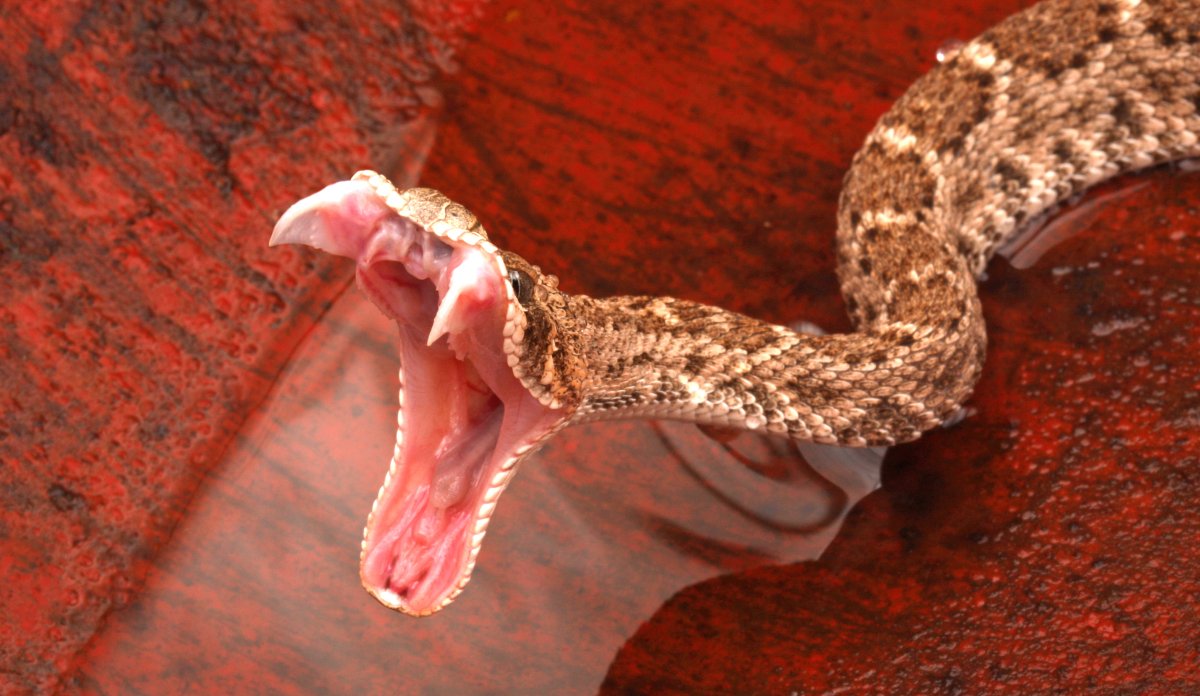The venom of some snakes and spiders can kill even the largest of creatures in a matter of hours, but it seems that the venom of this snake species may actually be good for us.
Scientists have found that the venom of a South American snake species called the lancehead pit viper Cotiara (Bothrops cotiara) contains chemicals that could help lower our blood pressure, according to a new paper in the journal Biochimie.
In the right doses, this venom protein could one day be used as a medical treatment.
"The venoms of Bothrops snakes, including Bothrops cotiara, are known to contain a mixture of enzymes and toxins that can lead to tissue damage, swelling, pain, and systemic effects. These effects may include bleeding disorders, low blood pressure, and other complications," Alexandre Tashima, co-author of the study and professor at the Federal University of São Paulo's Medical School (EPM-UNIFESP), told Newsweek.
The researchers found that a protein fragment or peptide in the snake's venom called Bc-7a may lower blood pressure, as it is functionally similar to proteins that make up the blood pressure-lowering drug captopril. Captopril and others like it work by inhibiting the activity of an enzyme called angiotensin-converting enzyme (ACE), which is important in the control of blood pressure in the body.
"We observed (in vitro) that the peptide Bc-7a is an inhibitor of the angiotensin-converting enzyme (ACE). In humans, ACE is important in blood pressure regulation because it inactivates bradykinin, a vasodilator peptide, and it also converts angiotensin I into angiotensin II, a potent vasoconstrictor and hypertensive agent," Tashima said. "However, it is important to note that we did not perform in vivo experiments in these studies, but we have plans to assay it in mouse models in future studies."

This discovery could pave the way to new forms of ACE inhibitor drugs that lower blood pressure, as many of the current drugs available cause unpleasant side effects including dizziness, a cough, and high blood potassium levels.
"Venoms never cease to surprise us. Even with so much accumulated knowledge, fresh discoveries are possible, such as unpredictable fragments that are parts of known proteins. Despite all the available technology, a great deal remains to be studied in these toxins," Tashima said in a statement.
This study also reveals that 197 proteins were identified in the venom of the snake, 189 of which were discovered in the venom for the first time. As of 2012, only 73 of the proteins had been identified. This spike in identification is due to advances in faster and more sensitive equipment, the authors note in the paper.
Another paper published by Tashima late last year found several proteins that have biotechnological potential in the venom of another snake: the South American bushmaster (Lachesis muta). Published in the journal Biochemical and Biophysical Research Communications, the study identified 151 peptides in the snakes' venom, 126 of which were previously unknown.
In particular, the protein Lm-10a is also an ACE inhibitor and, therefore, may also be potentially useful in developing blood pressure medication.
"Bc-7a and Lm-10a originated as fragments of hemorrhagic toxins, and are peptides with structures very different from the BPPs. Our studies show that other classes of peptides in the snake venoms can also inhibit ACE activity. The studies demonstrate that snake venoms are toxin cocktails, refined over millions of years of evolution, and may have developed multiple toxins with similar functions as a way to evade prey defenses. Potentially, peptides such as Bc-7a and Lm-10a could inspire a new generation of antihypertensive agents," Tashima said.

Several other previous studies have found that some spider venom may also contain medically useful compounds.
Much more research is needed before these spider or snake venom compounds are used in medicine, however. Tashima notes that these findings highlight the importance of saving species from extinction, as they may be able to provide us with as yet unknown treatments for medical issues.
"Despite advances in sequencing technology and the production of large amounts of data in recent years, much remains to be discovered about the vast universe of peptides and their biological roles. We must take advantage of our good fortune in being able to study these species, many of which will be extinct before they've even been discovered," Tashima said.
Do you have a tip on a science story that Newsweek should be covering? Do you have a question about snake venom? Let us know via science@newsweek.com.
Update 01/10/24, 11:23 a.m. ET: This article was updated with comment from Alexandre Tashima.
Uncommon Knowledge
Newsweek is committed to challenging conventional wisdom and finding connections in the search for common ground.
Newsweek is committed to challenging conventional wisdom and finding connections in the search for common ground.
About the writer
Jess Thomson is a Newsweek Science Reporter based in London UK. Her focus is reporting on science, technology and healthcare. ... Read more
To read how Newsweek uses AI as a newsroom tool, Click here.








